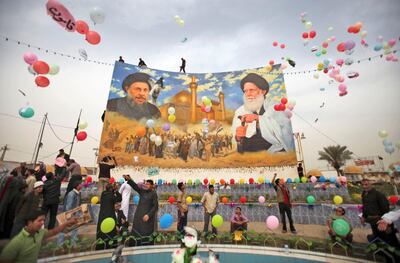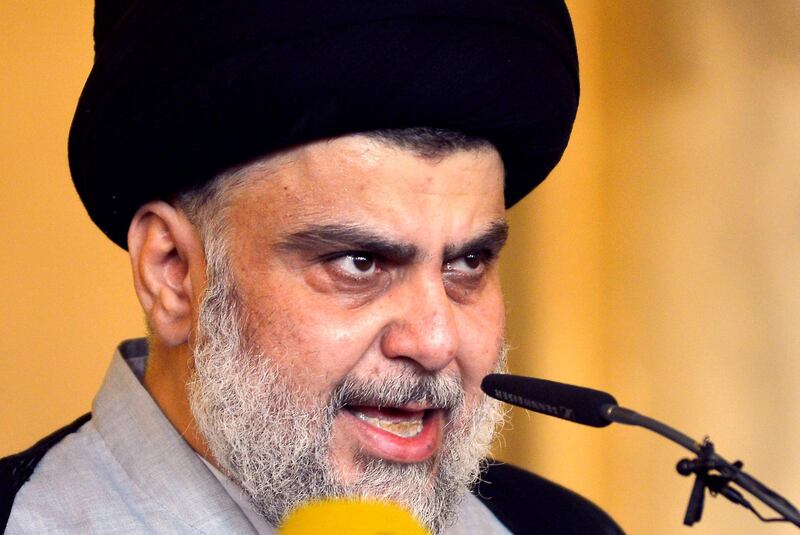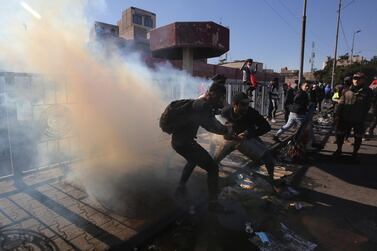Populist cleric Moqtada Al Sadr has turned against the Iraqi uprising, withdrawing protection to demonstrators and strengthening a government crackdown to crush the protest movement.
The uprising, which is demanding the removal of the entire political class, has undermined the influence of Iran, Mr Al Sadr’s patron.
In the past three days, attacks by security forces and Iran-backed militia, who overran protest centres in Baghdad and other cities in the south, killed at least 17 civilians and wounded 250, civil activists and the Iraqi High Commission for Human Rights said.
The attacks came after Mr Al Sadr said on Friday that he would no longer interfere in the protest movement.
Pro-Sadr militiamen, who had provided limited protection to the demonstrators, particularly in Baghdad and Basra, withdrew from the streets.
The demonstrations also denounced what many Iraqis regard as Iranian tutelage, in contrast to the narrative of Mr Al Sadr and other pro-Iran politicians, who blame Iraq’s ills on the US.

Mr Al Sadr made it clear in the past three weeks that he would focus on organising anti-US rallies to force American troops to withdraw from Iraq, a position he formulated after the killing of Iranian enforcer Qassem Suleimani on January 3.
In a tweet on Friday, Mr Al Sadr accused the demonstrators, many of whom belong to the Shiite underclass he champions, of ignoring an “impending danger” against Iraq, which he did not identify.
He had turned down pleas by many of his supporters not to go ahead with an anti-US march, saying it would undermine the three-month uprising.
The anti-US rally took place in Baghdad on Friday, giving a boost to the renewed crackdown on the uprising by the authorities and the militia supported by Iran, who have killed at least 700 civilians since October, with hundreds more abducted or disappeared.
Mr Al Sadr, 45, had called off another anti-US rally that was planned for last Sunday, saying the cancellation was “to avoid internal strife”.
The cleric has based his political career on being perceived as an outsider.
But he backed the Iraqi uprising without wholly committing to its demands for fundamental change.
The overhaul demonstrators want would in theory rid Iraq of a spoils system shared primarily between pro-Iran militia overlords and their political associates, and restore the rule of law.
Mr Al Sadr's position changed after the killing of Suleimani. The attack also killed Abu Mahdi Al Muhandis, Suleimani's Iraqi militia sidekick and a rival of Mr Al Sadr.
After their death, Mr Al Sadr met other Iraqi militia leaders, many of them rivals, in the Iranian city of Qom and called for the rally against US troops in Iraq.
Hamidreza Azizi, an Iranian political researcher, told The National that the interests of Iran and Mr Al Sadr have aligned more closely since January 3. Mr Azizi said the US attack made it clear Mr Al Sadr was no longer immune from similar US action.
Mr Azizi said it could give Mr Al Sadr an opportunity to try to become the supreme figure among the militias supported by Iran, not only in Iraq but across the Middle East.
“Sadr is behaving opportunistically,” Mr Azizi said.
“His relationship with Iran is better, but it remains mostly a tactical alliance.”
But an Iraqi member of parliament and a source in the Najaf seminary with ties to Mr Al Sadr's camp said any room for manoeuvre Mr Sadr may have had regarding Iran has greatly decreased since January 3.
They said Iran moved to contain any fallout from the Suleimani killing, clamping down on Mr Al Sadr and the other Iraqi warlords.
“Moqtada is just playing his favourite game, which is blackmail. He was never really with the uprising and his aim has been always to amass more spoils,” the Najaf source said.
“But make no mistake: Iraq is in Iran’s pocket.”
Mr Al Sadr's perceived legitimacy is largely derived from his father, ayatollah Mohammad Sadeq, and his uncle, ayatollah Mohammad Baqer Al Sadr, a seminal figure in Shiite theology.
The two men were killed during Saddam Hussein's rule while resisting his dictatorship.
Mr Al Sadr appeared on the Iraqi political scene in 2003 as the US-led invasion toppled Saddam and 40 decades of Baathist rule.
He identified with Shiites living in abject poverty in the slums of Baghdad and the south, as opposed to other Shiite players connected with the Najaf religious establishment and the merchant class.
From a glorified defender of Iraq's Shiite underclass, Mr Al Sadr's political ambitions are placing him at the top of a bloody counter-revolution against many of the downtrodden who had made him their hero and only hope.







